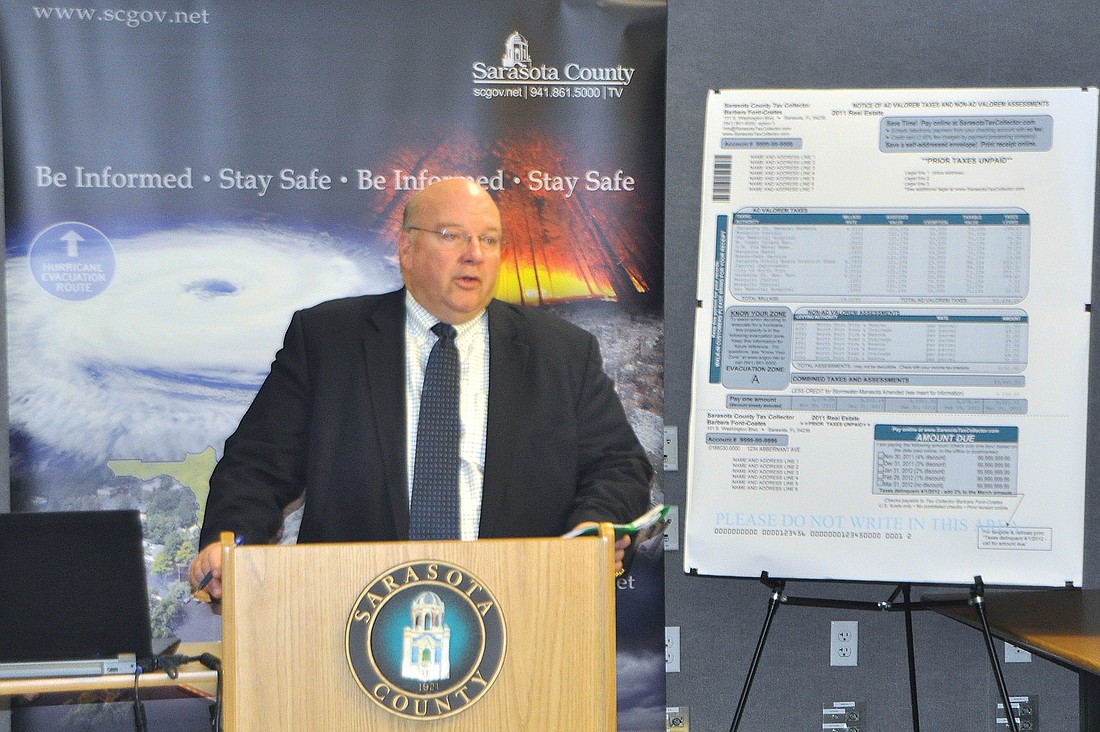- July 18, 2025
-
-
Loading

Loading

Randall Reid knows preparedness. The Sarasota County administrator was an Eagle Scout as a youth, a role he channeled while addressing media about the 2012 hurricane season with the mantra: “Always be prepared.”
Gulf Coast residents have likely heard the phrase every year as hurricane season approaches, but this year some county officials worry about underestimation of the dangers ahead during hurricane season, Reid explained during the meeting on Monday, May 21.
This is partly due to the number of hurricanes expected to form in the Atlantic Basin this year compared with data recorded during the 2011 hurricane season.
Ed McCrane, the county’s emergency management chief, reiterated Colorado State University’s Tropical Meteorology Project prediction of six hurricanes expected to form near Florida in the Atlantic Basin — a 33% decrease compared with last year’s totals. The average number of hurricanes recorded from 1950 to 2000 is 8.2, 26% more than this year’s prediction.
He also stressed the importance of early preparation, noting some behaviors that country residents should avoid.
For example, a preparation tip agencies often stress is to fill the family vehicle with gas — the tank itself, not gas cans.
“Having gas cans in your vehicle before a storm is very dangerous,” McCrane said.
Siesta Key residents, as well as those who work on the barrier island, should keep documentation of residency in case bridge access is restricted. Employees of Siesta businesses should have a note from their superior, McCrane said. This is a precaution designed to minimize looting if the island is badly damaged during a hurricane, he said.
Families should decide as soon as possible whether they would stay in their homes if a hurricane threatens Sarasota or evacuate, as the steps to ensuring safety are different for each scenario. (See below.)
The 2012 hurricane guide for the Tampa Bay area has not been released at the publishing time, however, McCrane said this year’s guide will be very similar to last year’s, with minor changes in regard to protocol for people with disabilities.
Hurricane Preparation Protocol
• Make a personal hurricane plan. Review and rehearse the plan with the entire family.
• Know your evacuation zone. (scgov.net/kyz/KnowYourZone.aspx)
• If someone has special needs and needs assistance, contact Emergency Management to get them registered before the hurricane.
• Fill bathtub with water for hygiene purposes.
• Fill containers with water (one gallon per person and pet per day).
• Fill vehicle gas tanks.
• Get cash (ATMs may be unavailable).
• Items you need to have and what you need to do regardless of your decision to stay or go.
• Have a disaster supply kit. (scgov.net/emergencyservices/DisasterKits/carkit)
• Inspect your home to determine how well it will withstand major hurricane winds.
• Maintain the outside of your home.
• If you don’t have pre-installed shutters, measure all windows for plywood covers.
• Review all insurance policies to ensure they are up-to-date and provide adequate coverage.
• Learn the storm surge history and flood potential of your area.
• Take a written inventory of belongings.
• Ensure your pets have tags with address and phone number.
During the hurricaneif you plan to stay:
• Stay inside at all times.
• Stay away from windows and doors.
• Listen to local media for continuous coverage of the storm.
• Have a set of “rabbit ears” or other small antenna on hand if cable or satellite is interrupted.
During the hurricane if you plan to evacuate:
• Determine in advance where you will go.
• Have a backup plan.
• Take your hurricane survival kit with you.
• If you plan to evacuate to a public shelter, familiarize yourself with local public shelters and what to do with your pets.
After the Hurricane
• Listen to local radio stations and your NOAA Weather Radio for emergency information.
• Do not use public water for cooking or drinking until you are notified it is safe.
• Only use telephone for emergencies.
• Carefully survey any damage.
• Stay away from downed power lines.
• Keep children from playing in standing water and make sure they are wearing shoes.
• Videotape or photograph your home prior to making any temporary repairs to prevent further damage.
• Clearly mark the street address on your home so insurance adjusters and repair crews can identity your location.
• Contact your insurance agent.
• If you have evacuated, do not attempt to return home until local officials have announced it is safe.